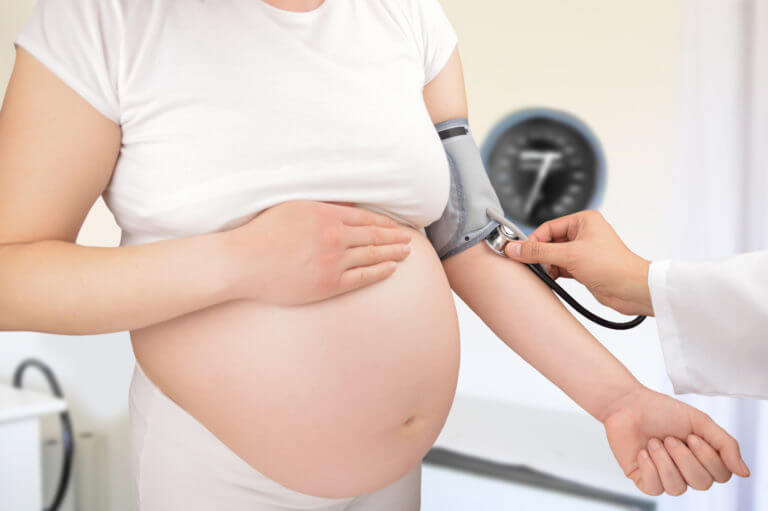
Preeclampsia is a very dangerous condition that can surface in pregnant women, usually after twenty weeks. Previously, preeclampsia was diagnosed by extremely elevated protein levels in the mother-to-be’s urine. After doctors determined that organ problems sometimes do not result in elevated protein levels but cause preeclampsia nonetheless, it became acceptable that the condition could also be diagnosed by persistent high blood pressure or the new development of decreased blood platelets. Other symptoms of preeclampsia include fluid in the lungs, or signs of brain trouble such as seizures and/or visual disturbances. While there is no single one cause of preeclampsia, the damage it can do can result in organ damage or failure, and, in the most serious cases, death for the mother and baby if untreated. With this dire prognosis, it’s important to know who is at risk for getting preeclampsia, what symptoms to look for, and how it can be treated or, better yet, prevented.
Who is at risk?
Who is at risk of contracting preeclampsia? A better question might be, who’s not at risk, since preeclampsia is a condition that can affect any pregnant woman. And an estimated 8 percent of pregnancies are actually affected, it’s critical to monitor your pregnancy throughout the term to avoid any complications, especially if you are in a higher risk group which includes first-time moms, women who get pregnant prior to age twenty and those older than forty. Moms who carry more than one baby and those with a family history are also at risk. Be particularly alert if your mother or sister had preeclampsia.
In addition to women who have high blood pressure or gestational hypertension, women with a precondition of kidney disease and those who are obese must be alert for any signs. Speak with your doctor about how weight, BMI or a preexisting condition might place you at risk of preeclampsia and what you can do to lessen that risk.
Symptoms
Water retention is a symptom of preeclampsia, as is high blood pressure and protein in the urine, as previously mentioned. These symptoms are primarily associated with mild preeclampsia. Your doctor should be proactive in the event that the symptoms appear.
Full-blown preeclampsia has more severe symptoms associated with it. Fatigue, headaches and blurred vision, along with sensitivity to bright light are all signals of severe preeclampsia. Shortness of breath, nausea and/or vomiting are also symptoms. If you try to urinate often but very little urine is being expelled, then this can be a symptom. Bruising easily or pain in the abdomen, particularly the upper right portion, are also signs of severe preeclampsia. Contact your doctor immediately if you have any of these symptoms.
Prevention
It is extremely important that women who are now or plan on becoming pregnant closely monitor their blood pressure. Poorly controlled high blood pressure increases the risk of contracting preeclampsia and eventually eclampsia. Women with high blood pressure prior to pregnancy are at a higher risk, but preeclampsia can also present with gestational hypertension. However, if a pregnant woman has gestational diabetes it doesn’t necessarily signal that she will also have preeclampsia.
Diagnosis and Treatment
At each check-up, your doctor will monitor your blood pressure, as well as take urine and blood samples to determine if you’re at risk. Your doctor will also order tests to check kidney function and blood flow, and perform ultrasounds to determine baby’s growth. The ultrasound is also a means to measure blood flow to the placenta, since preeclampsia can affect the amount of oxygen and food that is passed on to baby.
The cure for preeclampsia is basically, the delivery of your baby, so keeping track of your due date is very important; if the due date is not close expect interventions such as bed rest and body positioning that prevents the weight of the baby from pressing on your major blood vessels. Your doctor will also recommend a dietary change that will reduce or eliminate salt intake and include more lean protein. You should be drinking at least eight glasses of water a day; if not, the doctor will encourage you to consume more fluid. You can also expect the doctor to increase the frequency of your check ups.
If your baby hasn’t fully developed or at least developed enough to be born early, then the doctor may prescribe blood pressure medications. Once the baby is at a sufficient weight to enter the world, then mom will be induced so that the baby comes early.
University OBGYN Associates wants you to know that a safe delivery of a healthy baby is possible when preeclampsia is diagnosed early. This is one of the many reasons why prenatal care is so important. The friendly staff at University OB/GYN Associates welcomes your call and looks forward to serving you. If you have any questions about our women’s health services, please call our office at (315) 464-5162. To schedule an appointment, you can call us or use our secure online appointment request form.



